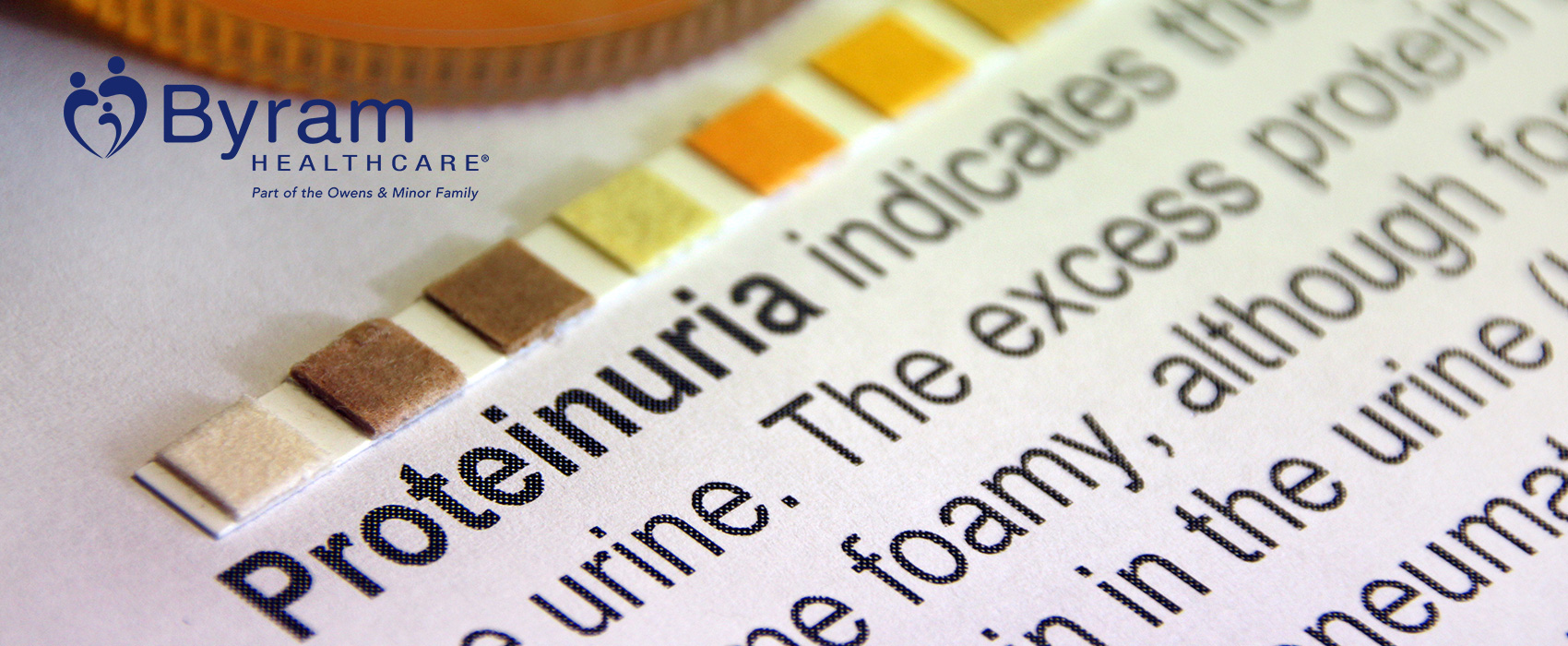
Your blood is made up of nutrients that you consume through fats, proteins, and carbohydrates. It’s how our body gets energy and continues to function throughout the day. Protein plays an important role in keeping your body strong by building bones and muscles, preventing infection, and controlling the amount of fluid in your blood.1 When you have a healthy urinary tract system, your kidneys work to filter your blood through small pathways of capillaries within the kidney structure. This filtering process removes waste and extra fluid but leaves proteins and other nutrients so they can be used throughout the body.1 When your kidneys are working properly, protein doesn’t pass into your urine. When your kidneys aren’t working properly, protein bypasses the filtration process and winds up in your urine.1 This is called proteinuria. In this article we’ll dive into answering the questions surrounding proteinuria: what is it and what does it mean?
How Common is Proteinuria?
First, it’s important to point out that anyone can have protein in their urine.1 It doesn’t necessarily mean that you have a serious underlying problem—especially if it’s only a trace amount. However, it is important to see a doctor if you experience any symptoms of proteinuria to make sure and better understand what’s going on. The normal amount of protein that a healthy person has in their urine is less than 150mg/day.2 This accounts for trace amounts of protein that might slip through the filtration process. If you have higher amounts of protein in your urine, it’s a sign that something is wrong. Proteinuria affects about 6.7% of the United States population and is most common in elderly and people who are suffering from chronic illnesses.2
What Does it Mean?
Proteinuria can be an indication of serious problems like kidney damage. When protein is able to get into your urine, it means that the filtration process is not working properly in your kidneys. It could either be damage to the glomeruli (tiny loops of capillaries that filter the blood) or damage to tubules that work as secondary filtration mechanisms.2 Either way, proteinuria means that you’re likely suffering from some degree of kidney damage.
Different Types of Proteinuria
Proteinuria is also referred to as albuminuria, because protein in your blood is called albumin. There are two main types of proteinuria: heavy proteinuria and low levels of proteinuria. Heavy proteinuria is when there are more than 2-3g/day of protein in your urine.3 This is more serious and will likely be paired with more severe symptoms or other side effects. Low levels of proteinuria occur when there is less than 1g/day but more than 150mg/day.3 Low levels of proteinuria should still be examined and monitored by a doctor, but doesn’t necessarily need immediate treatment. In most cases, your doctor will recommend that you keep an eye on your protein to creatinine ration (PCR) and call with any changes in symptoms or an increase in PCR.3
There are also three different classifications of proteinuria: tubular, overflow, and glomerular. Tubular proteinuria is a result of tubulointerstitial disease that affects the renal tubules and interstitiuum.4 Overflow proteinuria occurs with an increased production of abnormal proteins that cause the pass reabsorption capacity of tubules.4 This causes the proteins to ‘overflow’ into the urine. Glomerular proteinuria occurs when there is sufficient damage to the loops of capillaries that filter blood called glomeruli.4 Each type of proteinuria requires diagnosis by a urologist and has different treatment plans.
Causes of Proteinuria
Proteinuria can be caused by a number of different things. In most cases, it’s caused by either benign, non-cancerous problems or temporary medical conditions.2 Some of the main causes of proteinuria seem to be dehydration, inflammation, and low blood pressure.2 Acute cases of proteinuria can also be triggered by intense exercise, emotional stress, aspirin therapy, kidney stones, and exposure to cold temperatures.2 Urinary tract infections have also been shown to cause proteinuria in some patients.3
Each specific classification of proteinuria is caused by different things, so it’s important to talk with your doctor to better understand the underlying condition. Some things that can lead to proteinuria include:2
- Immune disorders like lupus and Goodpasture’s syndrome
- Acute inflammation of the kidney
- Cancer of plasma cells
- Intravascular hemolysis
- Cardiovascular disease
- Preeclampsia
- Poisoning
- Trauma
- Kidney cancer
- Congestive heart failure
In other cases, proteinuria is an early indication of chronic kidney disease.2 Chronic kidney disease involves a gradual loss of kidney function and will eventually require either dialysis or a kidney transplant.2 If you think you might have kidney disease, call your doctor immediately to avoid serious complications and start a treatment plan. If you have diabetes or high blood pressure, you’ll need to monitor proteinuria more closely as these are already common causes of kidney disease.1 If left unchecked, proteinuria can progress more quickly so it’s important to monitor your blood glucose levels.
Symptoms of Proteinuria
The main hurdle in determining if you have proteinuria is that the average person doesn’t regularly test their urine for trace amounts of protein. When you only have trace amounts of protein in your urine, or even in certain instances of low-level proteinuria, you likely won’t notice any outside symptoms. The only way to tell that you’re experiencing proteinuria in these cases is through a urinalysis. This is one reason that it’s important to see your urologist regularly. Even though low-level proteinuria doesn’t express many symptoms, it’s still an indication that something is wrong. By seeing your urologist regularly, you’ll be able to develop a baseline for your body so you’ll be able to know when to do further testing. The test for proteinuria is called the urine albumin-to-creatinine ration (ACR)1—similar to the PCR we mentioned above.
In more serious cases, or when proteinuria is high, there are a few tell-tale symptoms of a proteinuria problems. The following are signs that large amounts of protein are escaping through your urine:1
- Foamy, frothy, or bubbly-looking urine
- Swelling in your hands, abdomen, or face
If proteinuria starts to advance, you’ll also experience one or more of the following symptoms:2
- Increase in frequency of urination
- Shortness of breath
- Fatigue
- Nausea and vomiting
- Lack of appetite
- Muscle cramping throughout the night
- Puffiness around the eyes
All of these symptoms are also common symptoms of chronic kidney disease.2 If you notice any of the above, contact your doctor right away. Seeing a doctor immediately will reduce your chances of adverse side effects or serious complications. Proteinuria is also directly related to heart disease and people with higher levels of protein in their urine are more susceptible to having heart problems.3 If you have high blood pressure, high cholesterol levels, or are overweight, proteinuria symptoms could be fatal if ignored. Call your doctor immediately.
How to Treat Proteinuria
The first step in treating proteinuria is finding the underlying cause, which is why going to the doctor is so important. Your doctor will use a dipstick test to see if there are any proteins in the urine. The dipstick test will change color depending on what it detects.2 Then, your urologist will examine the urine under a microscope to look for things that shouldn’t be there—red and white blood cells, bacteria, crystals, and protein.2
If your doctor suspects that you could have kidney disease, you will need to schedule follow up tests to monitor urine composition over the course of one to three months.2 If all of the following samples indicate a presence of protein, your doctor will likely diagnose you with kidney disease.2 Your doctor may also test your blood for creatinine or use CT scans and ultrasounds to get images of the kidneys.2
Treatment will depend on the underlying condition, but often includes a mixture of medications, diet changes, weight loss, and exercise.2 Your doctor will continue to monitor you for any changes while you’re being treated.
Conclusion
If you have any signs or symptoms of proteinuria, it’s important to see your doctor immediately[B1] . Proteinuria can lead to kidney disease and if left untreated, will result in the need for dialysis or a kidney transplant. To avoid any complications or reduced the likelihood that proteinuria goes undiagnosed, schedule regular visits with your urologist. If you need any urological supplies or educational resources, don’t forget to visit our educational support page and our product selection guide. Byram Healthcare is proud to offer full-service urological care and we have all the high-quality urological supplies that you need. If you need to order any urological supplies, all orders can be discreetly delivered to your home, at any time of the day. If you have any urological questions or need personalized, confidential services, our teams of knowledgeable urological customer service specialists are here to help.
Sources:
1 https://www.kidneyfund.org/kidney-disease/kidney-problems/protein-in-urine.html
2 https://my.clevelandclinic.org/health/diseases/16428-proteinuria
3 https://www.nhs.uk/livewell/kidneyhealth/documents/protein%20in%20urine.pdf




